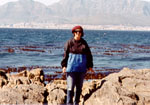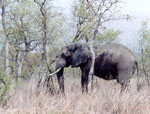Librarian shares skills, opens cultural doors in South Africa
by Cindy AbolePublic Relations
MUSC librarian Doris Wisher’s recent visit to South Africa was more than a dream vacation come true. Although her trip held many special moments and adventures, none could compare to a serendipitous afternoon of friendly conversation and interaction that allowed her to bridge cultures and cultivate relations with colleagues from halfway around the world.
For more than a year, library faculty, staff and visitors have grown accustomed to the growing collage of travel postcards and exotic photos that decorate the wall behind Wisher’s office desk. There’s also the pile of maps, brochures, city guides, foreign labels and travel artifacts located at the edge of her desk collected from her most recent journey for people to scan and peruse. Wisher hopes visitors who step into her small ambience can catch a glimpse of other countries and international travel and discover the joys of other cultures that she’s always eager to learn about.
“Reading and learning about people and other cultures have always been fascinating to me,” said Wisher, originally from Portland, Ore. “Some folks can get highly stressed when they’re in unfamiliar surroundings. I go in face first and worry about things later. That’s the beauty of traveling.”
 Wisher
poses for a photo from her recent visit to Robben Island with the country's
capital, Cape Town, in the background.
Wisher
poses for a photo from her recent visit to Robben Island with the country's
capital, Cape Town, in the background.
Wisher, who is a reference librarian and the statewide MedMentor, a library service program that provides guidance and support for faculty, preceptors and facilitators involved in community-based education programs, vacationed from Sept. 25 to Oct. 14 on a three-week odyssey around South Africa and surrounding nations. Her trip was part of a small tour that began in Cape Town and ended in Johannesburg.
Wisher spent some time as a Peace Corps volunteer and former public health officer serving 27 months in Eastern Gabon in the early 1980s. She also lived in Zimbabwe, working as a maternal nutrition researcher. In 1989 when civil war broke out in Senegal, she returned to the U.S. She is an experienced traveler visiting countries worldwide including Kenya, Zambia, India, Burma, Morocco, China and nearly every country in the Far East.
More than halfway through her trip, Wisher spent a free day in Cape Town exploring its history and people. Earlier, the group had successfully circled the region starting from the country’s capital and moving eastward to the Great Karroo, or high desert areas, and Zuurberg Mountains down to the country’s “garden route” of Port Elizabeth, Plettenberg Bay and the coastal towns around the Cape of Good Hope.
 An
elephant grazes in Kruger National Park, South Africa's largest game reserve.
The park was among the sights Wisher visited.
An
elephant grazes in Kruger National Park, South Africa's largest game reserve.
The park was among the sights Wisher visited.
Following a morning visit to Robben Island, the South African prison that housed South African statesman and former President Nelson Mandela for opposing apartheid, Wisher discovered the National Library of South Africa, which was just a short trek from her hotel.
The facility, equal in comparison to America’s Library of Congress, is considered to be the country’s library of record and was created in 1999 by combining two of its national libraries, the South African Library in Cape Town and the State Library in Pretoria. The library is also home to rare books, manuscripts and picture collections—preserving the country’s turbulent history and culture.
For Wisher, her impromptu visit sparked an opportunity for cultural discovery and rare networking with a special group of South Africans. Passing security, she was invited inside the massive facility and introduced herself to reference librarian Petrie LeRoux and other staff members. For the first half-hour, they exchanged and shared information—discussing issues that challenge the staff regarding handling of public inquiries and resources. They related their challenges in handling medical reference inquiries. None of the librarians had any medical librarianship background.
Wisher happily responded by introducing them to two online resources, PubMed.gov and Medline Plus, sites she uses and instructs people to learn in the Lowcountry. PubMed is the biomedical citation database developed by the National Center for Biotechnology Information, National Library of Medicine and National Institutes of Health. Medline Plus is the consumer web source from the National Institutes of Health and the National Library of Medicine, the world’s largest medical library. Both are Web resources that are free and available to the public via the Internet.
“Their initial response was that of skepticism and disbelief,” Wisher said. “They couldn’t imagine an American Web site that would provide medical information for free and not password protected. Obviously, this was a resource that they were not familiar with.”
Following a presentation and several online demonstrations, they exchanged
good-byes and parted ways both grateful and satisfied with the outcome.
Catalyst Online is published weekly, updated as
needed and improved from time to time by the MUSC Office of Public Relations
for the faculty, employees and students of the Medical University of South
Carolina. Catalyst Online editor, Kim Draughn, can be reached at 792-4107
or by email, catalyst@musc.edu. Editorial copy can be submitted to Catalyst
Online and to The Catalyst in print by fax, 792-6723, or by email to petersnd@musc.edu
or catalyst@musc.edu. To place an ad in The Catalyst hardcopy, call Community
Press at 849-1778.